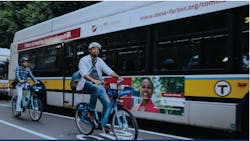Results from Boston Transportation Department’s Main Streets pilot show public transit subsidies for employees increases ridership, eases financial burdens
Results were released from a report by the Boston Transportation Department and ideas42 for the Main Streets Free Transit pilot.
In the pilot, 1,000 Main Street employees were sent Massachusetts Bay Transportation Authority (MBTA) and Bluebikes subsidies over a two-month period in summer 2021, demonstrating increased ridership across the board. Read the full report the city of Boston’s website.
In a randomized control study, participants were either given $60 passes or $5 passes. Participants with $60 passes rode the bus or subway an average of 8.29 times during the first four weeks of the program, compared to 2.05 rides for those with the $5 cards — an increase of 304.4 percent. The gains applied to even participants with car access.
Additionally, the transit incentives eased financial stress for Main Streets Districts employees during the pandemic. In one poignant example, a participant became homeless during the program, but the preloaded card allowed them to continue going into work.
The program offered up to a $60 credit for MBTA and Bluebikes passes for the first 1,000 employees who signed up who worked in five Main Street Districts: Three Squares in Jamaica Plain, Mission Hill, Nubian Square, East Boston and Fields Corner. All five Main Street districts are served by MBTA subway and Bluebikes stations. Of the 1,000 qualified workers, some individuals were randomly selected to get an MBTA pass with the full $60 credit loaded, and the remainder of the individuals received smaller stipends over time that ended up totaling $60. Bluebikes pass-holders were able to take unlimited trips during the two-month period.
“The success of this pilot program shows that expanding access to transit can accelerate our economic recovery and connect our communities,” said Boston Mayor Michelle Wu. “This program has removed barriers across our neighborhoods, increased ridership during the pandemic and eased congestion on our roads for transit riders and drivers across the city. We will continue to move urgently to expand safe, reliable and accessible transportation for all.”
The program highlights the need for reduced or free fares for low-income riders. The MBTA does not currently have low fare options for low-income, non-disabled riders between the ages of 26 and 64. Given the success of this pilot and other programs, the city of Boston has already extended the fare-free Route 28 bus pilot and is exploring options to expand the fare-free bus pilot to other routes.
This report was developed by ideas42 with support from the Bloomberg Philanthropies American Cities Climate Challenge. Ideas42 is a non-profit looking for deep insights into human behavior and using that knowledge in ways that help improve lives, build better systems and drive social change.
The Climate Challenge is an initiative that empowers 25 of the largest U.S. cities to implement near-term climate goals and become primary drivers of progress towards meeting America’s pledge on climate. Recognizing that cities account for more than 70 percent of global carbon emissions — and that mayors have significant authority over cities’ highest emitting sectors: transportation and buildings — the Climate Challenge aims to enhance the work already being done by mayors across the U.S. and to support cities in the fight against climate change.
